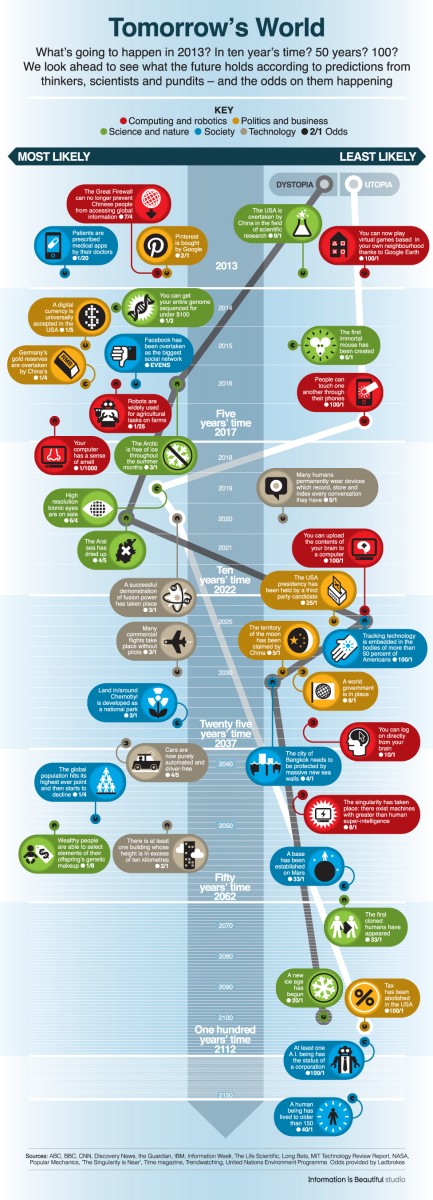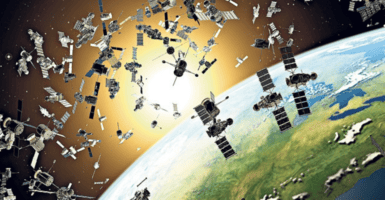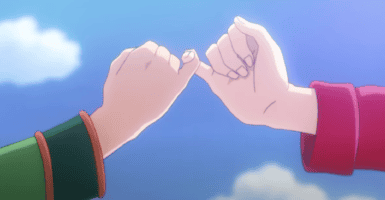What The World Will Look Like in 100 Quintillion Years
This article is more than 2 years old
 Other than time travelers, no one can tell what the future holds, but that doesn’t stop people from speculating. BBC Future has really outdone itself when it comes to prognostication. Last year they predicted what would happen over the next 150, placing events and developments on a scale from most to least likely. To compile the list, they amassed dozens of predictions made by scientists, bloggers, and other pundits. They consulted Ladbrokes, a British betting firm, to come up with the odds of these predictions actually happening, though I’m not entirely sure how they come up with the exact numbers.
Other than time travelers, no one can tell what the future holds, but that doesn’t stop people from speculating. BBC Future has really outdone itself when it comes to prognostication. Last year they predicted what would happen over the next 150, placing events and developments on a scale from most to least likely. To compile the list, they amassed dozens of predictions made by scientists, bloggers, and other pundits. They consulted Ladbrokes, a British betting firm, to come up with the odds of these predictions actually happening, though I’m not entirely sure how they come up with the exact numbers.
According to this graphic, the BBC thinks that we’ll be able to pay $100 for the sequencing of our genomes during this calendar year, and that scientists will create the first immortal mouse by next year. They also envision Facebook being overtaken as the biggest social network by 2016. Interesting. A bunch of the predictions also have to do with climate change. We’ll be able to log-on directly from our brains in 25 years, and we’ll have a base on Mars within 50 years. None of these calculations are too difficult to imagine, but that’s because this timeline is relatively modest. Not so for BBC Future’s new timeline. These folks are nothing if not ambitious, and in their new timeline, they look forward 100 quintillion years. Not familiar with that number? That’s 100,000,000,000,000,000,000 years in the future.
 That’s a mind-boggling dose of information. The color-coding for Earth, humanity, and heavens helps, as do the size of the dots which correspond to the enormity of the event. Given recent news about the increasingly dire climate change problems and the likelihood that the governments of the world won’t be able to keep global warming under the previously agreed upon 2 degrees Celsius, the environmental predictions are especially grim. BBC Future expects that in 2,000 years, global warming will be “extreme”—an increase of 8 degrees Celsius, enough to cause the ice sheets of Greenland to melt; they predict the entire country to be melted in 50,000 years. Niagara Falls will be done too, due to the erosion of Lake Erie. They also think 29% of the carbon dioxide released this century will still be around in 1,000 years. In 500,000 years, they predict a new ice age, provided that we’ve consumed all our fossil fuels. But in half a million years, we may have even bigger fish to fry.
That’s a mind-boggling dose of information. The color-coding for Earth, humanity, and heavens helps, as do the size of the dots which correspond to the enormity of the event. Given recent news about the increasingly dire climate change problems and the likelihood that the governments of the world won’t be able to keep global warming under the previously agreed upon 2 degrees Celsius, the environmental predictions are especially grim. BBC Future expects that in 2,000 years, global warming will be “extreme”—an increase of 8 degrees Celsius, enough to cause the ice sheets of Greenland to melt; they predict the entire country to be melted in 50,000 years. Niagara Falls will be done too, due to the erosion of Lake Erie. They also think 29% of the carbon dioxide released this century will still be around in 1,000 years. In 500,000 years, they predict a new ice age, provided that we’ve consumed all our fossil fuels. But in half a million years, we may have even bigger fish to fry.
Within 500,000 years, the BBC believes Earth will be hit by a big ol’ asteroid (not if the asteroid-blasting space cannon has anything to say about it). And that’s only if the global disaster (which could be anything from a volcanic eruption to an asteroid) expected to occur within the next 100,000 years doesn’t wipe us all out. On the upside, Chernobyl should be safe in about 20,000 years, so maybe folks can live there, and in 500,000 years the nuclear fuel in our reactors will be safe.
The planet will undergo some serious changes, too. Mount Rushmore will erode in 7,200,000 years. The Red Sea will flood in 10,000,000 years, making a new ocean, though we may lose the Mediterranean and Antarctica in 50,000,000 years. In 250,000,000 years, the continents on Earth will fuse together to a new supercontinent. Oh, the circularity…
In 5 million years, the Y chromosome could become extinct, although the BBC folks equivocate on that one. Photosynthesis will cease becoming possible in 600,000,000 years, causing the death of most species, and in a billion years, all life except perhaps some simple organisms at the pole will have died.
In 20 billion years, the universe might expand to the point that all matter is torn apart and the whole show ends. But maybe not. 110,000,000,000,000 years into the future, all stars may be kaput, following the death of Earth. But hey, that’s a long, long time from now. Even if Google achieves immortality, it’s unlikely we’ll be around to see much of this. The robots will have long left Earth for greener pastures, and if we’re lucky, maybe they’ll bring us along.












